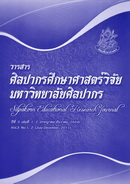รูปแบบการพัฒนาสมรรถภาพการสอนโดยการบูรณาการแบบสอดแทรกสำหรับนักศึกษาครู เพื่อเสริมสร้างคุณลักษณะอันพึงประสงค์ของผู้เรียน
บทคัดย่อ
บทคัดย่อ
การวิจัยและพัฒนานี้ มีวัตถุประสงค์เพื่อพัฒนารูปแบบ ทดลองใช้และศึกษาประสิทธิผลของรูปแบบ การพัฒนาสมรรถภาพการสอนบูรณาการแบบสอดแทรกสำหรับนักศึกษาครูเพื่อเสริมสร้างคุณลักษณะ อันพึงประสงค์ของผู้เรียน กลุ่มตัวอย่างคือ นักศึกษาครูชั้นปีที่ 5 มหาวิทยาลัยราชภัฏเพชรบุรี จำนวน 46 คน เครื่องมือที่ใช้ คือ คู่มือของรูปแบบการพัฒนาสมรรถภาพการสอน ชุดแบบประเมินสมรรถภาพ การสอน 3 ด้าน ได้แก่ ด้านความรู้, ทักษะ และอัตมโนทัศน์ แบบประเมินคุณลักษณะอันพึงประสงค์ของ ผู้เรียนประเด็นสนทนากลุ่ม และสัมภาษณ์ การวิเคราะห์ข้อมูลเชิงปริมาณใช้ค่าเฉลี่ยส่วนเบี่ยงเบนมาตรฐาน การวิเคราะห์ความแปรปรวนทางเดียวแบบวัดซ้ำ และข้อมูลเชิงคุณภาพใช้การวิเคราะห์เนื้อหา ผลวิจัยสรุป ดังนี้ 1.
1. รูปแบบการพัฒนา ประกอบด้วย (1.1) แนวคิดการพัฒนา 3 แนวคิด คือ การเรียนรู้แบบเน้น ประสบการณ์เป็นฐาน การเรียนรู้ด้วยตนเอง และ การเรียนรู้ตามสภาพจริง (1.2) กระบวนการพัฒนา สมรรถภาพการสอน 6 ขั้นตอน คือ การให้หลักการ/ความรู้ การวิเคราะห์วิจารณ์ การกำหนดเป้าหมาย การฝึกปฏิบัติ การแลกเปลี่ยนเรียนรู้ และการประเมินผล (1.3) กระบวนการนำรูปแบบไปใช้ มีการอบรมเชิง ปฏิบัติการ 3 วัน และการนิเทศจากครูพี่เลี้ยง และอาจารย์นิเทศก์ รายละเอียดในคู่มือของรูปแบบการพัฒนา 2.
2. ผลการใช้รูปแบบและศึกษาประสิทธิผลของรูปแบบ โดยสรุปมีดังนี้ 2.1
2.1 ค่าเฉลี่ยพัฒนาการของสมรรถภาพการสอน ด้านความรู้ความเข้าใจ ด้านทักษะปฏิบัติและ ด้านอัตมโนทัศน์ของนักศึกษาครู จากการประเมิน มีอัตราเพิ่มขึ้นอย่างมีนัยสำคัญทางสถิติที่ระดับ .01
2.2 ค่าเฉลี่ยพัฒนาการคุณลักษณะอันพึงประสงค์ของผู้เรียน ด้านความมีวินัย และความ รับผิดชอบ จากการประเมิน มีอัตราเพิ่มขึ้นอย่างมีนัยสำคัญที่ระดับ .05 ส่วนด้านจิตสาธารณะ และด้าน การคิดเพื่อการเรียนรู้ เพิ่มขึ้นเล็กน้อย
Abstract
This research and development study aimed to develop, try out and study the effectiveness of an instructional capacity model using an infusion integration approach of pre-service teachers for forming the students’ desirable character. The sample was 46 pre-service teachers in Petchaburi Rajabhat University. The research instruments were the manual of an instructional capacity model, an evaluation form on instructional capacity consisting of 3 aspects: knowledge, skill, and self-concept a character apprasial form and the key issues from focus group discussions and interviews. The quantitative data were analyzed by mean, standard deviation and ANOVA repeated measure, whereas the qualitative data were analyzed by content analysis. The research results can be concluded as follows:
1. The instructional capacity model using the infusion integration approach consisted of (1.1) three concepts for developing this model were experience-based learning, self-directed learning and (c) authentic learning (1.2) the significant process related to the effectiveness of this model were (a) the workshop (18 hours /3 days) (b) the process of supervision by mentors and supervisors. A details contained in the manual of this model.
2. The conclusions of the effectiveness of an instructional capacity model were:
2.1 Growth rate of instructional capacity: knowledge capacity, performance capacity and self-concept capacity increased significantly (p .01), in term of evaluation.
2.2 Growth rate of the good character of responsibility and discipline trait increased significantly (p .05), in term of evaluation but trait of public mind and learning thinking were slight increase.





